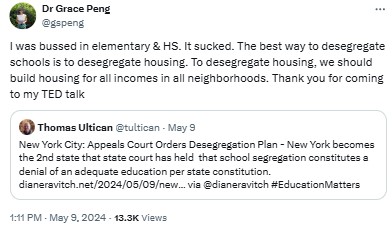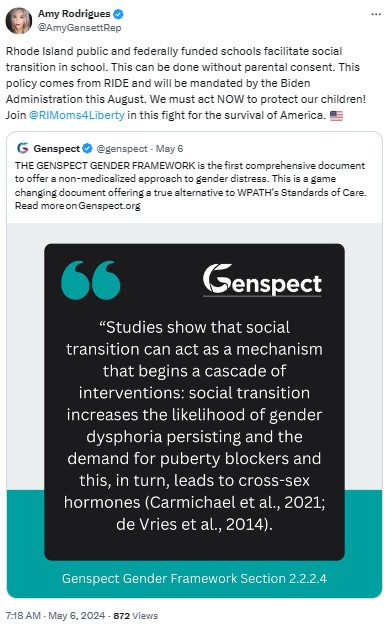The recent spate of campus demonstrations supporting the anti-Semitic terrorist group Hamas returned attention to something I’m not aware of having seen since the Occupy Wall Street days: the activist “mic check.”
Among Leftist organizers, this practice is offered as a humanistic means of amplifying a speaker’s voice without equipment. The person who has the floor for attention says “mic check,” which signals to those who can hear him or her that they are supposed to repeat everything the speaker says. They do this (the rationale goes) so everybody in the crowd can hear what is being said.
Of course, increasing its effective volume is not all repeating something somebody says word-for-word accomplishes. It also generates a sense of agreement. If you doubt this proposition, imagine yourself in a “mic check” situation when the speaker says something you find utterly abhorrent. Do you repeat it simply so those farther away than you can hear what’s being said?
We interpret the world through our experience of it, and people don’t simply repeat what others say. During a Q&A session at an event, for example, the person with the microphone will attribute statements he or she is repeating for the benefit of the rest of the audience: “This person is saying…” In conversation, if you wanted to clarify a statement, you might do the same, or you might speak with an implied question mark: “This is what that means?” To do otherwise, implies agreement: “Yes, this is what that means.”
The effect is more powerful while in the midst of a crowd. All of you, together, are affirming (at least in part) the speaker’s content, and since you can’t know the extent of each person’s agreement, the aggregate seems greater.
So, when activists request “mic check” treatment, they’re using psychological manipulation to pull the crowd under their own wills. Even if you maintain your autonomy and don’t necessarily agree with everything being said, having to repeat it as it’s spoken makes it more difficult to consider each statement critically. At the very least, the thinking gap between each statement is taken from the audience, as the speaker makes a statement, pauses only for the repeat, and then speaks again.
Conceptually, the notion that this is somehow humanizing illustrates the radical inversion of the truth and radicals’ understanding of other people. In their own parlance, they might say something like, “We’re using our own human voices to raise each other up, rather than accepting the hierarchical construct of a speaker imposing his statements on passive listeners because he has the power of a microphone. Without all of us, the speaker cannot be heard!”
But that isn’t how the social interaction is structured. It’s positioned as a “mic check,” which means that members of the audience are dehumanized; they become the speaker’s instrument.
Featured image by Justin Katz using Dall-E 40 and Photoshop AI.
[Open full post]On WNRI 1380 AM/95.1 FM, John DePetro and Justin Katz discuss:
- Pawtucket employee gets the red R
- Providence students on a union string
- Amo’s vote for illegal alien voting
- CRMC and prosecutorial government
- Bad times, disapproving, but still voting Biden
- Diossa enjoys the perks of office
- Big money to promote racial division in state government
Featured image by Justin Katz using Dall-E 40 and Photoshop AI.
[Open full post]I do think he should have followed the line about his family correcting his joke with “thanks grandma,” but who am I to kvetch?
[Open full post]The problem at the heart of well-meaning progressive policies is that they tend to ignore second-order effects. They want outcome X, so they push policy U and ignore that side-effects V and W also happen, and consequences Y and Z might not prove desirable. Housing mandates, for example, require on their face that we cede the principle that government can mandate housing design from the top down and forbid Americans from cooperating to design neighborhoods that are structurally to their liking. Structurally, mind you; I’m not talking about the people who might buy the available houses.
That’s my concern with this idea:
The solution isn’t mandates; it’s opportunity. Freedom is a great leveling force, and it was working in America until progressives got impatient and gave a power that is obviously intended to prove insufficient until it is absolutely total.
[Open full post]Listening to Tim Ferris interview China policy expert Matt Pottinger left me with the impression the United States desperately needs to find a path back to a sense of national unity. Two of Pottinger’s suggestions are particularly relevant:
- The Chinese government is using (or at least was using, before Congress passed related legislation) TikTok to sow division among Americans.
- International actors, whether governments, companies, or other organizations, can have incentive to side with dictatorial regimes like the Chinese Communist Party because, even if nothing else, they provide stability of policy against which to react.
We could argue about whether the second point is short sighted. Tyrannical regimes tend to be predictable only until they’re not. Their guiding lights can be inhuman, so their incentives can surprise even corrupt non-tyrants. Still, the point is well taken: A representative democracy that might change its leadership structure every two or four years can swing in ways a lifelong dictatorship probably won’t.
Two factors mitigate against this problem, and both have been eroding in the United States. One is a commitment to a shared core of cultural principles, and the other is a tight limit on government power. If the world knows, for example, that the vast majority of Americans will insist on economic freedom and global free markets, international actors can consider those principles consistent and act accordingly. Alternately, if those actors can count on Americans and their non-governmental organizations to act in their own interests under a government that has limited ability to dictate terms, then that state of affairs is predictable regardless of election results.
The problem, in this context, is not that the United States is politically dynamic, but that we’ve allowed our periodic elections to become too important. If we want to decide every major issue through government, and at the highest levels, then frequent changes are a liability. The alternative is freedom in a system designed to encourage maximal cooperation, which is what we once had. In that case, human nature, itself, provides the stability.
This morning, on Memorial Day, I reflected on a question somebody recently asked me online: if I’ve ever served in the military. I answered that I never could, for physical reasons, that I would not serve under the current regime (including the Deep State bureaucracy), but that I’ll fight to defend the country from its enemies should the need arise.
How might that position relate to Memorial Day? Did those who’ve given their lives do so in vain? Or am I speaking against my own call for unity? I wish I could answer these questions easily. It seems to me we’ve betrayed those men and women, but then, I can’t speak for them, and their opinions would probably vary, in any event.
If we could define some (important) shared principles, we could unify around them, but I’m not sure we can. I’m not even confident modern Americans could articulate their own principles outside their immediate political positions. For example, Democrats might insist respecting election results has to be the agreed foundation, but everybody would understand that to be a dig at Donald Trump and “MAGA Republicans,” who would be skeptical the principle would hold were the circumstances reversed. Meanwhile, Republicans might put individual freedom on the table as a shared principle, but Democrats would question their positions on a variety of social issues.
Personally, between these two, I think the MAGA Republicans have the better case, but my opinion isn’t very helpful toward the goal of national unity. Indeed, I have to admit that I don’t think national unity is possible on the current field of play. The wary international actors are right to be worried; America’s core principles are up for grabs.
This leaves us no choice but a sort of cultural trench warfare, although not with guns and bombs, but with good will and persuasion. I think each of us must define the core principles that, for us, we should unify around and then win the social debate on their behalf, gathering allies who agree on the narrow point, even if they disagree on various applications. So, the first act is to decide what the narrowest possible core principle is for you, if you could transcend the politics of the day.
In a world where TikTok can be considered a weapon of war, the notion of cultural trench warfare does not seem as much like stolen valor as it may have previously. Wary of the latter, however, as we fight, we should measure our work against the sacrifices of those who gave all, asking if we are vindicating or deprecating their sacrifices.
Featured image by Justin Katz using Dall-E 40.
[Open full post]Many people would likely see it as an obscure topic reported in a minor venue, but Christian Winthrop’s recent article in The Newport Buzz about the Federal Trade Commission’s (FTC’s) move against noncompete agreements hits three distinct notes that fire me up.
The first is that it is unambiguous propaganda:
In a landmark decision aimed at fostering competition and protecting workers’ rights, the Federal Trade Commission (FTC) has issued a final rule banning noncompete agreements nationwide. This ruling, announced today, is poised to unleash a wave of innovation, bolster job mobility, and promote the formation of new businesses across the United States.
The article — or activist press release that Winthrop published as if it were an article — does not substantiate any of these claims or offer any indication of contrary arguments. It simply continues rolling out the one-sided promotion.
The second outrage is the destruction of due process that the article celebrates. The FTC, for those who’ve lost track of government’s moving parts, is not Congress. Its members are not elected. Rather, elected officials have some partial say in their selection, among all the other appointments and policies they must negotiate and balance. That raises the bar for any democratic correction of the FTC so high as to be unreachable.
The article’s attempt to paint a veneer of legitimacy on the process is laughably insulting:
The FTC’s decision comes after a thorough review process, which included a 90-day public comment period during which over 26,000 comments were received, overwhelmingly in support of the ban on noncompetes.
The commission announces a possible change in some place that most Americans wouldn’t know to check and gives those who discover it no more than three months to respond and attempt to organize an opposition. Little wonder comments are “overwhelmingly in support”; the advocates have all the advance warning they want.
Not that this matters. The commission doesn’t have to consider the arguments at all. The letters are merely representation theater, at best helping the bureaucrats to gauge how much opposition they’ll actually face and, maybe, raising a novel point that’s so powerful they’ll turn against the activists they’d intended to serve. In the end, three of five commission members can impose sweeping rules that change existing contract agreements out from under the parties who agreed to them. Three people.
The final irksome note in the article is the blissful ignorance of the people making the decision — and reporting on it. Consider:
FTC Chair Lina M. Khan emphasized the significance of the ruling, stating, “Noncompete clauses keep wages low, suppress new ideas, and rob the American economy of dynamism, including from the more than 8,500 new startups that would be created a year once noncompetes are banned.”
This is completely inverted. Much of my work, with both start-ups and well-established companies, involves helping different parties work together to innovate. Noncompete clauses are often essential to building the confidence for collaboration. Confidence that proprietary, or even merely innovative, systems will remain confidential and an advantage versus competitors decreases risk and therefore increases the ability to pay higher wages, explore new ideas, and inject the economy with dynamism.
What accounts for those “8,500 new startups” Khan touts? If they materialize, it seems likely she means they’ll be taking the experience for which their employers have been paying and compete against them. This change will decrease the trust by which a dynamic economy thrives.
Even the ruling of itself does immeasurable harm. Simply the knowledge that the United States invests these unaccountable boards with the power to modify contracts on the fly makes business in our country riskier. Add in the fact that our society now lacks the benefit of a skeptical news media (at least when Democrats are in charge), and it’ll soon be a wonder if anybody invests their own resources to innovate, at least in a collaborative way with people outside their families or tribes.
Featured image by Justin Katz using Dall-E 40 and Photoshop AI.
[Open full post]This video of some proverbial “frat bros” mocking some antifa clowns brought to mind Saul Alinsky’s encouragement toward mockery of the opponent:
Preparation for conflicts is crucial, however. The mockery worked because the antifa were outnumbered and in somebody else’s element. Mockery is a group activity. You must have a group.
[Open full post]Civility and compassion are important traits we should, as a society, strive to inculcate in our children and uphold ourselves. However, big-state nannyism has reached the point that well-meaning people no longer appreciate the distinction between how we should act as responsible people and what we should be forced or forbidden to do by an armed government.
I have in mind legislation in the Rhode Island General Assembly that would do as advocate Mary T. O’Sullivan summarizes:
Right now, the Rhode Island State Senate has approved an anti-bullying law, The Workplace Psychological Safety Act (H.B. 8044 and S.B. 2473) “would make it unlawful for an employer or employee to “engage in psychological abuse … that creates a toxic work environment in which a reasonable person would find it intolerable” to perform regular work duties, or that could cause injury or jeopardize future career prospects”.
My experience with manual labor in the seafood industry and then in construction provided many memories to fill out details for phrases like “psychological abuse” and “toxic work environment,” but the word “intolerable” is perplexing. If a work environment is intolerable, why not leave? It seems an unstated assumption of such legislation (perhaps subconscious) that workers are either children incapable of understanding their role as responsible decision-makers or slaves, held in their jobs by force of government.
Beyond the stress and anxiety that signaled the problem, “intolerable” work environments had three positive effects on me. They made me stronger; they prodded me to seek better opportunities; and they motivated me to improve myself so I would have more leverage as I did so.
The counterpoints to this testimony are easy to imagine. My situation might have had some underlying advantage or privilege. Not everybody has the wherewithal to turn negatives positive. Some people won’t succeed quickly enough to avoid cataclysmic problems for themselves and their families. These points may be true for some, but they aren’t automatically decisive, but must be balanced against other possibilities and implicit change to our system of government when we use it to take action.
Imposing statewide rules by force of law will have unintended consequences advocates do not recognize. It will also prevent people from the opportunity for growth and learning, if they’re capable, while also making employment risky for employers who can’t know where the subjective line of “bullying” will end up through the regulatory and litigation processes. And then there will be employees who take advantage of the law to take advantage of their employers.
Again: if a situation is intolerable, don’t tolerate it. Leave.
To this admonition, the objection may come that many people simply don’t have the opportunity to leave a job. They need money, and they can’t move. Here, we have identified the actual problem. The answer to abusive employers is to make business easier, not riskier. Then free adults will be able to decide for themselves when a situation is intolerable, and the perpetrators will find themselves with a natural incentive to be better.
Of course, this would reduce the ability of do-gooders to use state government to impose their will on others, which one suspects is the point. They want to be the adults caring for children and the slave masters telling people how they must conduct their business.
Featured image by Justin Katz using Dall-E 40 and Photoshop AI.
[Open full post]On WNRI 1380 AM/95.1 FM, John DePetro and Justin Katz discuss:
- Is Ken Block’s billboard an expensive outcry?
- Can we read between the bars of a corrections hire?
- What is the problem with suburban fire staffing?
- Is Congressional District 2 up for grabs?
- Should Morgan debate McKay?
- What’s the Washington Bridge really going to cost?
- Do Providence students really understand why teachers are on the chopping block?
- What’s up with Ruggerio’s absences?
Featured image by Justin Katz using Dall-E 40 and Photoshop AI.
[Open full post]… leads me to the conclusion that whoever is controlling education policy wants young adults to be ignorant and emotionally unstable:
I’m glad people are starting to pay attention, but I’m not optimistic anything can be done. I couldn’t believe when this policy filtered down from the Obama administration a decade ago. And I still can’t believe there hasn’t been more outrage or, at least, a political cost to the promoters of these policies.
[Open full post]











